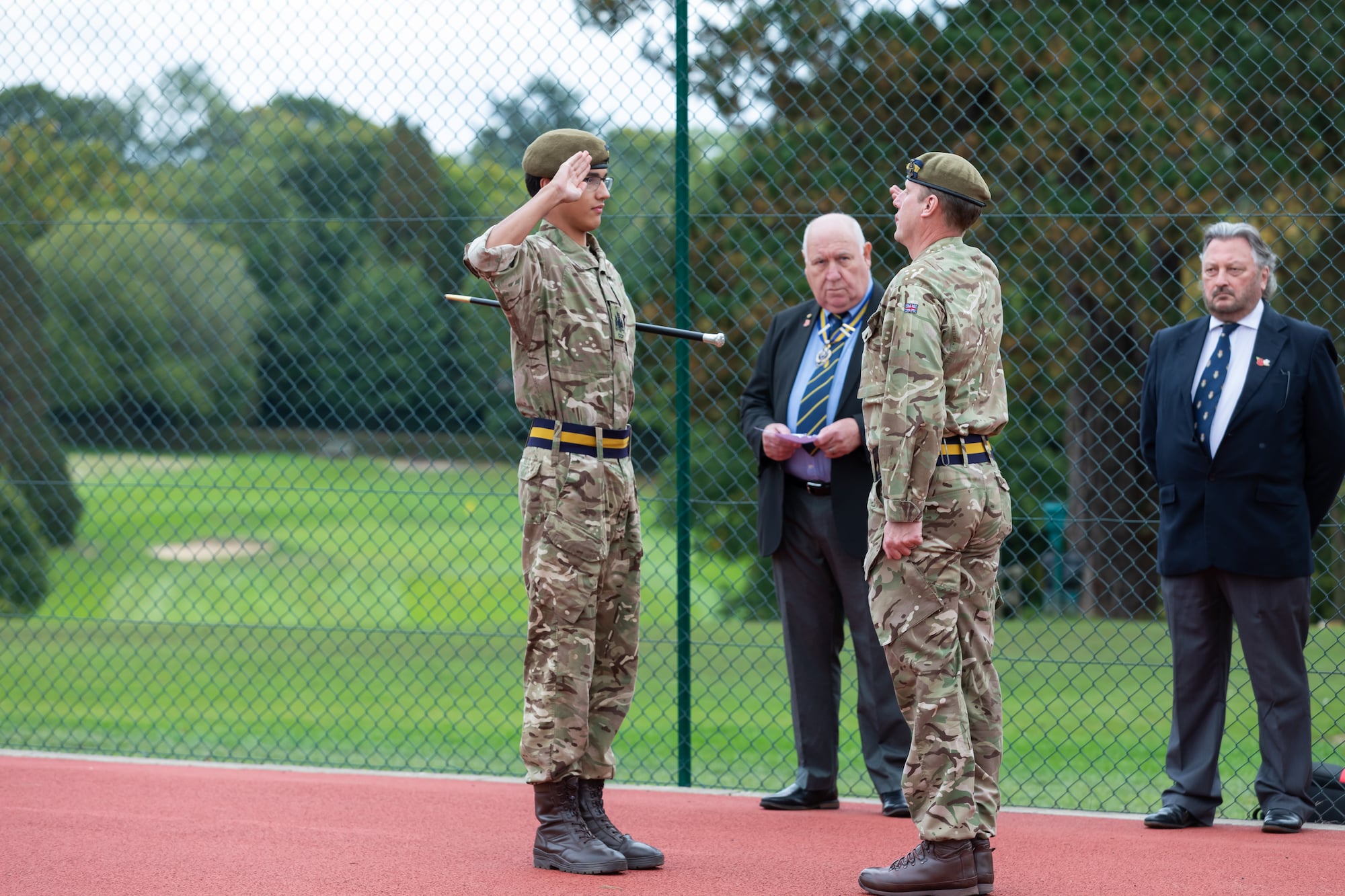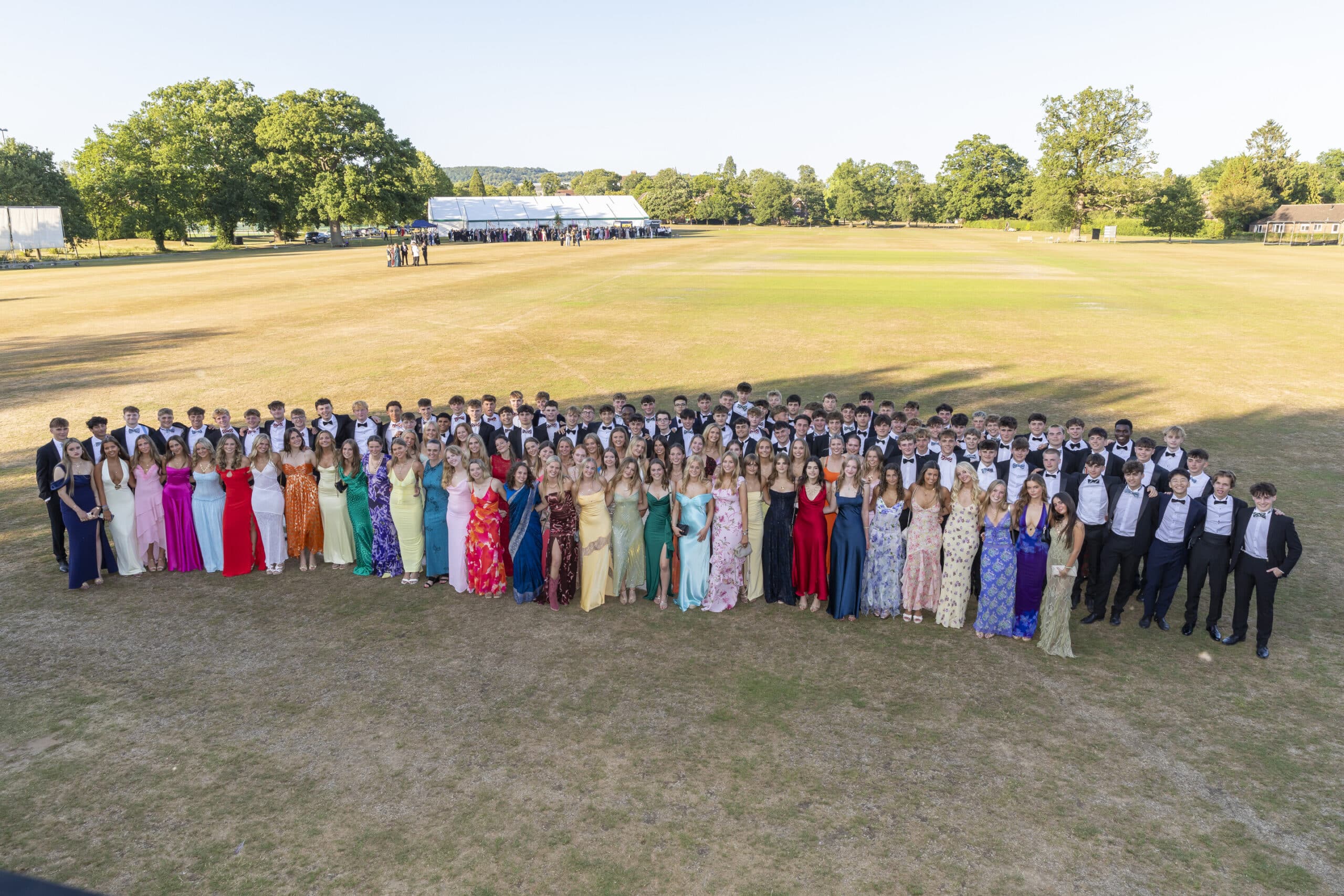 There is only one place to start this review: with Bialystock and Bloom. As with Zero Mostel and Gene Wilder in the 1968 film and (I assume from its 2,502 performances and its 12 Tony Awards) Nathan Lane and Matthew Broderick in the Broadway show, Tommy Lyster and Jon Oldfield were the heart of James Copp’s outstanding production. This was not just two of the School’s finest actors of recent years playing lead roles, this was a true relationship, what in modern vernacular might be called buddy roles or even a bromance.
There is only one place to start this review: with Bialystock and Bloom. As with Zero Mostel and Gene Wilder in the 1968 film and (I assume from its 2,502 performances and its 12 Tony Awards) Nathan Lane and Matthew Broderick in the Broadway show, Tommy Lyster and Jon Oldfield were the heart of James Copp’s outstanding production. This was not just two of the School’s finest actors of recent years playing lead roles, this was a true relationship, what in modern vernacular might be called buddy roles or even a bromance.
Of course there were solo moments, especially in Max Bialystock’s hilarious sung monologue ‘Betrayed’ which summarises the whole show, in which Tommy had to command centre-stage and did so magnificently. This scene (begun in a strait-jacket) is a parody of the end of Stravinsky’s ‘The Rake’s Progress’, libretto by Auden and Kallman, and similarly strangely moving. But even more memorable were the scenes in Max’s office because the spark between the two was something truly rare.
 The show ran in the Speech Hall from the 5th-9th March and followed a distinguished history of camp theatre at Cranleigh going back at least to the famous Redgrave days with Vivian Cox’s productions now also in the legendary realm. In 1979 I saw a rehearsal for the late Alan Megahey’s version of Aristophanes’ ‘The Frogs’ containing a camp ballet to the music of Constant Lambert; soon afterwards there was his House production of ‘Joseph’ (Peter McNiven tells me his set budget was £78); I have even directed four Joe Orton plays myself. But there was something almost moving about seeing a rainbow flag hoisted over the chorus in ‘The Producers’ as a parody of the dourly serious ‘Les Mis’: camp has become mainstream. My generation learned their camp from the ‘polari’ of Kenneth Williams and Hugh Paddick: we now live in the world of Robbie Williams and Brian Paddick.
The show ran in the Speech Hall from the 5th-9th March and followed a distinguished history of camp theatre at Cranleigh going back at least to the famous Redgrave days with Vivian Cox’s productions now also in the legendary realm. In 1979 I saw a rehearsal for the late Alan Megahey’s version of Aristophanes’ ‘The Frogs’ containing a camp ballet to the music of Constant Lambert; soon afterwards there was his House production of ‘Joseph’ (Peter McNiven tells me his set budget was £78); I have even directed four Joe Orton plays myself. But there was something almost moving about seeing a rainbow flag hoisted over the chorus in ‘The Producers’ as a parody of the dourly serious ‘Les Mis’: camp has become mainstream. My generation learned their camp from the ‘polari’ of Kenneth Williams and Hugh Paddick: we now live in the world of Robbie Williams and Brian Paddick.
All this leads up to commending Rory Savage for his outrageously enjoyable Roger de Bris (only Yiddish speakers will get the name joke). No boy of his age can feel entirely comfortable in such a role (as his own programme note implied) but the whole show is parody and Mel Brooks’s theatrical camp is a long way from Peter Tatchell; married to Anne Bancroft for over 40 years, Brooks’s gay characters are as hilarious as his ridiculing of Hitler.
Rory sang really well and carried off his costumes (even Marie Antoinette) with aplomb. He was superbly supported by his entourage, especially his ‘common-law assistant’ Carmen Ghia, played with amazing assurance by young Ben Castle-Gibb in tacky jewellery and white braces. The chorus of queens (‘Keep it Gay’) had great fun and so did the audience, with members of all persuasions having their minds boggled when the play’s best prop (Sabu’s golden glittery shorts) is produced from Bloom’s pocket. Ben Roberts carried off his task here with great good humour.
 The show is, of course, not to be taken too seriously but Mel Brooks himself has said that “If you stand on a soapbox and trade rhetoric with a dictator you never win… But if you ridicule them, bring them down with laughter, they can’t win. You show how crazy they are.” Brooks is a Brooklyn-born Jew of Russian origin (Mel Kaminsky) who fought in the war, so the ludicrous accusations against his film and musical of tastelessness seem rather odd. He knew what happened in the death camps and that Roger de Bris would have been there along with Bialystock and Bloom (named, of course, after James Joyce’s Dublin Jew). A nice touch is the inclusion of the doyen of New York’s Yiddish theatre Boris Thomashevsky (played by Alex Livingstone).
The show is, of course, not to be taken too seriously but Mel Brooks himself has said that “If you stand on a soapbox and trade rhetoric with a dictator you never win… But if you ridicule them, bring them down with laughter, they can’t win. You show how crazy they are.” Brooks is a Brooklyn-born Jew of Russian origin (Mel Kaminsky) who fought in the war, so the ludicrous accusations against his film and musical of tastelessness seem rather odd. He knew what happened in the death camps and that Roger de Bris would have been there along with Bialystock and Bloom (named, of course, after James Joyce’s Dublin Jew). A nice touch is the inclusion of the doyen of New York’s Yiddish theatre Boris Thomashevsky (played by Alex Livingstone).
Brooks’s revenge on Hitler is seen in the person of Franz Liebkind (the name implying he is Hitler’s bastard son) and here Bruno Broughton, whose excellent acting has been previously seen in cameos, brought his combined talents of actor and singer to bear. We met him in a disconcertingly charming scene with puppet birds, just one of many inspired theatrical ideas that even a long review like this can only hint at (the chorus of hair-curlers and zimmer frames, for example). Bruno’s leder-hosen-clad performance was a big hit with the audience, and rightly so. When he broke his leg (one of the show’s less subtle jokes) the sound technicians greatly added to the entertainment.
Most of us reviewers never know remotely enough about the technical side of theatre to do more than express shock and awe at the skill and scale of the effort: more than thirty people were involved under the guidance of Mark Jenkins and in the October edition of ‘The Cranleighan’ you will be able to read his insight into the months of preparation needed to put on a musical of this scale while having wings on only one side of the stage. This is an area also where the bursarial staff have key input in their work on the set: the programme listed them all but it seems appropriate to thank carpenter Peter Tugwell, who retires this month after 17 years’ service. Mark even got a brief stage appearance, along with Peter McNiven and Marcus Pashley: a great tribute to his fellow ‘producers’ by director James Copp. Peter’s designs were terrific and superbly lit.
There is one star yet to be named, Rosie Singleton, who played Ulla Inga Hansen Benson Yansen Tallen Hallen Svaden Swanson. It is well known that Rosie already has a management deal but only a true artist could, at her age, adapt to so many styles of music so idiomatically and, as with all the singers, her microphone technique was exemplary. Her interplay with the audience after the interval was done with great confidence, and acting with a Max and Leo two years above her held no fears: she’s got it and she flaunted it. The other female parts were less starry (the named parts are two-thirds male) but there was a wonderful turn from Grace Lent as the show’s only real Nazi (Leo’s boss) and the chorus work was superbly choreographed by Jo Meredith.
 The musical has only one memorable tune, but what a number! ‘Springtime for Hitler’: once heard, never forgotten and Jonathan Hobbs did it full justice with his fine stentorian tenor. There remain twelve actors listed in the programme biographies whom I have not named, and so many in the various choruses that I have not even counted them. Each was a shining tessera in the colourful mosaic of the stage picture. And behind the stage, in the chill of the VCT, was the band.
The musical has only one memorable tune, but what a number! ‘Springtime for Hitler’: once heard, never forgotten and Jonathan Hobbs did it full justice with his fine stentorian tenor. There remain twelve actors listed in the programme biographies whom I have not named, and so many in the various choruses that I have not even counted them. Each was a shining tessera in the colourful mosaic of the stage picture. And behind the stage, in the chill of the VCT, was the band.
The two dozen musicians did not have to rehearse as long as the actors but this was no turn-up and sight-read crew. It is astonishing how many instruments some of these pit-less pit musicians were expected to play and the names in the programme included four pupils of genuine professional quality (they could not otherwise have coped with what hard-bitten instrumentalists admit is a very challenging score). Many others were either full-time music staff, current peripatetic teachers or old friends of the School. Marcus Pashley balanced the score with a fine ear and relished the Wagner parodies as only a true Wagnerian can, though not even he will hope to move from the Siegfried oath to the thing itself as a school opera!
The evening ends first in Sing-Sing correctional facility where Max and Leo put on ‘Prisoners of Love’ and then back on Broadway, where the ‘in’ jokes do not fully transfer to a school production but both here and with the Jewish humour James Copp made sensible cuts to allow for the nature of the audience. In any big show audience reaction is vital and all ages responded to the performances with cheers and laughter, even if it was at times just at seeing their friends doing silly things rather than at Brooks’s witty allusions to Nietzsche and Kafka.
When he was on BBC radio’s ‘Desert Island Discs’ in 1978 (well before he adapted his film for Broadway) Mel Brooks chose ‘Springtime for Hitler’ as one of his eight discs. ‘The Producers’ has certainly earned its place in the top eight Cranleigh School plays of recent times. As much as I enjoyed Tommy Lyster and Jon Oldfield in ‘Hamlet’ and their lead roles in Ibsen, there was something special about their charismatic chemistry: this wonderful ensemble effort which will linger in the memory long after they have moved on to the next level of their acting careers.
PJL
Back to all news














